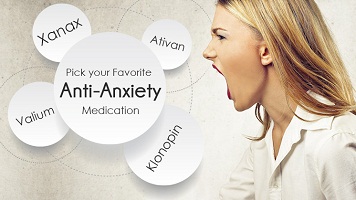Anxiety medication pros and cons
Anxiety Treatment Medication
Understanding Anxiety Treatment Medication: Types and Their Uses
Learn about anxiety treatment medication at Best Lean Online. Your go-to online pharmacy for all health requirements. Explore our offerings today. Anxiety disorders are among the most common mental health conditions, affecting millions of people worldwide. Effective treatment often involves a combination of therapy and medication.
There are several classes of medications commonly prescribed for anxiety, each with its unique mechanism of action and benefits. The main types include:
Selective Serotonin Reuptake Inhibitors (SSRIs): SSRIs are often the first line of treatment for anxiety disorders. They work by increasing the levels of serotonin in the brain, a neurotransmitter that plays a key role in mood regulation. Common SSRIs include fluoxetine (Prozac), sertraline (Zoloft), and escitalopram (Lexapro).
Serotonin-Norepinephrine Reuptake Inhibitors (SNRIs): SNRIs function similarly to SSRIs but also increase the levels of norepinephrine, another neurotransmitter involved in mood regulation. Examples of SNRIs include venlafaxine (Effexor) and duloxetine (Cymbalta).

Benzodiazepines: These medications are typically used for short-term relief of severe anxiety symptoms. They work by enhancing the effect of a neurotransmitter called gamma-aminobutyric acid (GABA), which has a calming effect on the brain. Common benzodiazepines include alprazolam (Xanax), lorazepam (Ativan), and diazepam (Valium).
Beta-Blockers: Although primarily used to treat heart conditions, beta-blockers can also help manage physical symptoms of anxiety, such as rapid heartbeat and trembling. Propranolol (Inderal) is a well-known beta-blocker used for this purpose.
Buspirone: This medication is specifically used to treat generalized anxiety disorder (GAD). It works by affecting the levels of certain neurotransmitters in the brain and is known for having fewer side effects compared to other anxiety medications.
Each of these medications has its own set of indications, benefits, and potential side effects. It is crucial to work closely with a healthcare provider to determine the most appropriate medication and dosage for your specific condition.
Exploring the Benefits of Anxiety Medication: How They Can Improve Your Life
Anxiety medications can significantly improve the quality of life for individuals struggling with anxiety disorders. Here, we will explore the various benefits of anxiety medication and how they can positively impact your daily life.
One of the primary benefits of anxiety medication is the reduction of anxiety symptoms. Medications like SSRIs and SNRIs can help alleviate persistent feelings of worry, fear, and tension, allowing individuals to function more effectively in their daily lives. This can lead to improved performance at work or school, better relationships, and an overall sense of well-being.
Another significant benefit is the improvement in sleep patterns. Anxiety often disrupts sleep, leading to insomnia or restless nights. Medications such as benzodiazepines and certain antidepressants can help promote better sleep, which is essential for overall health and well-being.
Anxiety medications can also help manage physical symptoms associated with anxiety, such as rapid heartbeat, sweating, and trembling. Beta-blockers, for instance, are particularly effective in controlling these physical manifestations, allowing individuals to feel more in control of their bodies and less overwhelmed by their anxiety.
For those with social anxiety disorder, medication can make social interactions more manageable. By reducing the intensity of anxiety symptoms, individuals may find it easier to engage in social activities, form new relationships, and participate in events that they would have otherwise avoided.
Furthermore, anxiety medications can enhance the effectiveness of therapy. When used in conjunction with cognitive-behavioral therapy (CBT) or other therapeutic approaches, medication can help individuals better engage in the therapeutic process and achieve more significant progress in their treatment.
It is important to note that the benefits of anxiety medication can vary from person to person. Some individuals may experience rapid improvement, while others may require a longer period to see noticeable changes. Additionally, finding the right medication and dosage may involve some trial and error, but the potential benefits make it a worthwhile endeavor.
Alternative Treatments for Anxiety: Beyond Medication
While anxiety medications can be effective in managing symptoms, they are not the only treatment option available. Many individuals benefit from a combination of medication and alternative treatments to address their anxiety. Some alternative treatments for anxiety include:
Cognitive Behavioral Therapy (CBT): CBT is a type of psychotherapy that focuses on identifying and changing negative thought patterns and behaviors that contribute to anxiety. It can be highly effective in reducing anxiety symptoms and improving overall mental health.

Mindfulness and Meditation: Practicing mindfulness and meditation can help individuals develop greater awareness of their thoughts and emotions, leading to reduced anxiety and increased emotional regulation.
Exercise: Regular physical activity has been shown to reduce anxiety symptoms and improve mood. Exercise can help release endorphins, which are natural mood enhancers, and provide a healthy outlet for stress and tension.
Diet and Nutrition: A balanced diet rich in essential nutrients can support mental health and reduce anxiety. Avoiding excessive caffeine and sugar intake can also help manage anxiety symptoms.
Support Groups: Joining a support group can provide a sense of community and connection with others who are experiencing similar challenges. Sharing experiences and coping strategies can be beneficial in managing anxiety.
Anxiety Medication Side Effects: What You Need to Watch Out For
While anxiety medications can offer significant benefits, they also come with potential side effects that need to be carefully considered. In this section, we will discuss common side effects associated with different types of anxiety medications and what you should watch out for.
SSRIs and SNRIs: Common side effects of SSRIs and SNRIs include nausea, dizziness, dry mouth, and sexual dysfunction. Some individuals may also experience increased anxiety or agitation when starting these medications, but these symptoms often subside after a few weeks. It is essential to communicate any side effects to your healthcare provider, as they may need to adjust the dosage or switch to a different medication.
Benzodiazepines: While effective for short-term relief, benzodiazepines can cause drowsiness, confusion, and impaired coordination. Long-term use can lead to dependence and withdrawal symptoms, making it crucial to use these medications only as prescribed and for the shortest duration necessary.
Beta-Blockers: Common side effects of beta-blockers include fatigue, cold hands and feet, and dizziness. These medications can also affect heart rate and blood pressure, so individuals with certain heart conditions should use them with caution.
Buspirone: Buspirone is generally well-tolerated, but some individuals may experience dizziness, headaches, and nausea. Unlike benzodiazepines, buspirone does not cause sedation or dependence, making it a suitable option for long-term use.

It is important to remember that not everyone will experience side effects, and for many, the benefits of anxiety medication far outweigh the potential risks. However, being informed about possible side effects allows you to make better decisions about your treatment and seek timely medical advice if needed.
In addition to these common side effects, there are also potential risks associated with abruptly stopping anxiety medication. Discontinuation syndrome, characterized by symptoms such as dizziness, irritability, and flu-like symptoms, can occur if medication is stopped suddenly. It is crucial to follow your healthcare provider’s guidance when discontinuing or changing medications to minimize these risks. Buy Painkillers online.
Ultimately, the decision to use anxiety medication should be made in collaboration with a healthcare provider, considering the potential benefits and risks. Regular monitoring and open communication with your provider can help ensure the most effective and safe treatment for your anxiety disorder.

I think what you wrote was actually very logical.